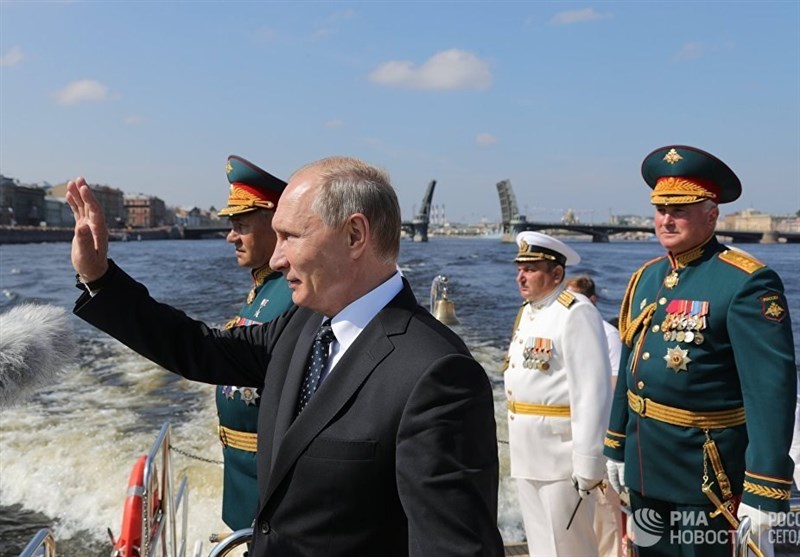The New Naval Doctrine underscores on the expansion of Russian Navy presence in seas, oceans, particularly in the North Pole, Pacific and Atlantic Oceans as well as Mediterranean, Caspian and Black seas. It clearly illustrates borders of the country in regions like the North Pole and the Black Sea. In the meantime, it also defines main threats against the national security of Russia.
Although in Russian Naval Doctrine, the national interests of the country, as a “major naval power”, have been extended to all oceans throughout the world, but an overview of the present situation of Russian Navy shows that the country does not have enough naval bases throughout the world. Therefore, the priority of Russia in development of strategic and naval cooperation will be with important regions which have been defined as maritime regions with geostrategic importance in the Russian military and naval doctrine.
Caspian Sea, Black Sea and East Mediterranean are among “important regions” where the Russian Navy should provide its national interests from economic and security viewpoints. Therefore, the perspective of promotion and development of such cooperation which are also considered very important for economic development of Russia, can be positive and influential for the national and regional security. The cooperation may include member countries of Shanghai Cooperation Organization, particularly India, China and also further developed cooperation with Iran and even Saudi Arabia.
As the sea for peace and friendship, the Caspian Sea may provide a groundwork for naval cooperation of Russia with the Caspian Sea littoral states, especially Iran; as Iran should also practice a close surveillance on the military activities of various countries in the Caspian Sea, it should seize the availing opportunity to expand its cooperation with Russia aimed at upgrading its navy, and should seek for collective security for the Sea. It is obvious that the establishment of thorough security in maritime regions under the sovereignty of the Islamic Republic of Iran is the most important principle for Iranian Navy.
In the meantime, putting emphasis of the new doctrine on increasing presence and growing naval power of Russia in the Black Sea and East Mediterranean can cause dangers for NATO and particularly for Turkey in long term. NATO’s presence in East Mediterranean parallel with rising Russian hegemon and presence in the region, followed by the annexation of Crimea peninsula, will make double the risk for increasing tension. Strong Russian presence in the Black Sea followed by the outbreak of clashes with Ukraine and fortifying its geopolitical status, will provide Russia the possibility of the upper hand to bring, in fact, the Black Sea under its control. Thus, to change and to interpret the laws as well as treaties to formulate the passage of ships through strategic straits like Bosporus to its own benefit and to expand the capabilities of the country to observe and safeguard all maritime movements in the Mediterranean. That’s why equipping the Russian Navy with new hypersonic missiles within a few months, any threat, raising impediments for trafficking of Russian military vessels and submarines through straits in East Mediterranean may lead to military clash. On this basis, the importance and the necessity of active presence of the country’s navy in these regions have been underscored in the New Russian Naval Doctrine.
Having regarded the extent of unknown resources of energy, the importance of oil and gas fields development in energy and even foreign policy of Russia (which are conducted under Putin’s direct supervision), any exploitation and sale of oil and gas from the aforementioned regions, is one of the main motivations of Russia to “deploy the country’s navy to the North and East Mediterranean”.
On the other hand, Russian policy in Asia and in the North Pole overlaps considerably. Moscow intends to further approach Japan. In the meantime, it tries to further militarize the region. Therefore, the possibility to establish an isolated and militarized region can not be rejected. At the same time, Russia will continue to remain in contradiction with Japan in Asia. It sees Asia as a collection of hostile and threatening powers which can only be dealt within the framework of militarization. Likewise, as the North Pole is the strategic gateway of Russia to Atlantic and Pacific Oceans, and keeping it is considered to be one of the main objectives of Russian military policies, the stronger presence of Russia in the region will offer the country greater access and assault the enemy’s naval connecting channels.
Conclusion
Events that took place within the past recent months will leave no promising future to minimize the profound gap between Russia and the Western powers. The New Russian Naval Doctrine tries to diversify and to expand its naval cooperation with all friendly countries in order to make unity and coordination in their naval strategy and also the arms export will make sure the Westerners, particularly the U.S. that they do not have the capability to confront and assault Russia. If the Russian interests are in danger, they will face the crucial reaction of Russian military forces, especially in (high) seas.
Characteristics and Strategic Consequences of Iran’s Historic Response to Zionist Regime
Strategic Council Online—Opinion: There are two different views about the Islamic Republic of Iran’s missile attacks against the Zionist regime. The first view is based on a superficial reading and a reductionist description that evaluates it as a low-impact and not-so-extensive operation. The second view, a realistic reading, sees Iran’s response as opening a new page of “balance of power” and “turning point” in regional equations, the effects and consequences of which will gradually emerge.










0 Comments